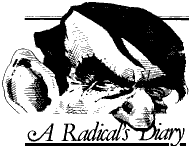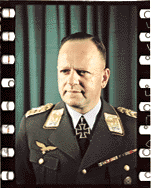 David
Irving might be someone whose
name we do not mention in polite
company, but... David
Irving might be someone whose
name we do not mention in polite
company, but...

|

Tuesday,
February 12, 2002
London -- Brentwood -- London I DRIVE the twenty miles or so out to
Brentwood in Essex, getting stupidly
distracted on the last roundabout and
finding myself doing a ten mile detour up
the A-12 instead. I loop back over the
exit bridge for "Hutton Industrial
Estate." Ten minutes of road, and a rewind of
sixty years of memories. The Hutton where
I was born was a sleepy little village
with a grocer's run by Mr Williams,
a gentle old man with sandy, wispy hair,
too old for Churchill's army; he cut
cheese with a wire on a pull-handle,
measured out the sugar into a brown bag
and thumped both ends and wrapped it shut
with a string, and cut the coupons out of
the ration-book with a pair of L-shaped
scissors I have never seen since. At the
far end of the village, where the road
forked, was the tiny store run by a
wizened old lady, Mrs Savage, whose
opened door jangled a friendly bell that I
can still hear in my memory, reviving all
the excitement of spicy smells and the
bike-oils and brace-and-bit drills that
pocket-money was meant for. One day in 1944 as we walked over the
fields to Sunday church we saw a fresh
crater where one of Field Marshal
Erhard Milch's V-1 flying bombs had
come down, just behind Mrs Savage's. Those
things packed a wallop, two-tons of
aluminised explosives, Trialen. Tangled
wires, tubes, strange components and
jagged alloys rimmed the deep and
smouldering pit, and the kind of flash
burns that a fire-cracker might cause but
on a larger scale. Beyond the church was the Bluebell
Wood, where a Heinkel 111 had been brought
down in 1940; we used to picnic near the
wreckage -- my older brother swore to me
that our village constable, P.c.
Andrews, had found a Cowboy and an
Indian piloting the Nazi bomber, and I, a
three-year old, implicitly believed him
for ages.  Years
later, of course, I visited Milch
(right) in
Düsseldorf, and finagled his private
diaries out of him for the writing of
Hitler's
War (I had to write his biography
first, that was the deal, and did so). Years
later, of course, I visited Milch
(right) in
Düsseldorf, and finagled his private
diaries out of him for the writing of
Hitler's
War (I had to write his biography
first, that was the deal, and did so).
The sense of excitement still
overwhelms me as I drive out through
London's increasingly dusky East End --
the Jews of the Mile End Road have long
been displaced by the Bangladeshi's and
Pakistanis -- and into Essex, towards my
roots. Picture
by Walter Frentz  THANKS to my detour, I am late: it is two
minutes to four as I drive in to the
Brentwood School yard and park beneath the
clock-tower. My old alma mater,
established 1496. The tree at which they
burned the Catholic martyr at that time
has now vanished from outside our
schoolroom window but the two trees
between which I suspended the 12 foot
hammer-and-sickle flag over the main gate
on April 1, 1956 are still there: that was
my last term and I was a member of the
most exalted school form, but I was still
beaten for that prank. Did me no lasting
harm, so far as I can judge. I tell the
children , the sixth formers who have
assembled in the Library to hear me, how
much greater is the sense of anticipation
I derive from this short stretch of
clogged tarmac out to Essex than from all
those thousands of miles of driving across
the United States last summer.
THANKS to my detour, I am late: it is two
minutes to four as I drive in to the
Brentwood School yard and park beneath the
clock-tower. My old alma mater,
established 1496. The tree at which they
burned the Catholic martyr at that time
has now vanished from outside our
schoolroom window but the two trees
between which I suspended the 12 foot
hammer-and-sickle flag over the main gate
on April 1, 1956 are still there: that was
my last term and I was a member of the
most exalted school form, but I was still
beaten for that prank. Did me no lasting
harm, so far as I can judge. I tell the
children , the sixth formers who have
assembled in the Library to hear me, how
much greater is the sense of anticipation
I derive from this short stretch of
clogged tarmac out to Essex than from all
those thousands of miles of driving across
the United States last summer.
My topic is Dr
Joseph Goebbels, Hitler's
Propaganda Minister, and the Problem of
using the Diaries of an acknowledged Liar.
The audience like it -- at least "nobody
dies," as I used to say when touring in
Germany (until tragedy intervened, alas,
and it was no longer true). The
"birdie-spoon" gets passed around from row
to row, and the pupils finger it --
gingerly, in view of whose mouth had once
clamped round it. Over dinner, the history master tells
me that they invited a certain German
professor, Peter
Longerich, to speak a few weeks
ago -- this Lipstadt defence witness and
self-professed expert on whether Adolf
Hitler ordered the Holocaust
("there are still no documents, but it's
clear he did"). Told that they had also
invited me, Longerich expressed shock,
says my host, and pleaded with the school
to reconsider, saying that they were only
increasing my "academic credibility" by
such invitations. What chutzpah: the guest in our
country, Longerich pleads with my old
school not to let me speak to its
sixth-formers, as I did for the umpteenth
time today. And doesn't it tell us
something about how "academics" work: each
such "scholar" bolstering the other's
credibility in an endless act of
intellectual incest -- one hand washes the
other, as we say (or is that a German
saying?).  BACK at Grosvenor-square at 9:30 p.m.
There is a message from a Harvard friend
quoting what British journalist Simon
Heffer writes in the latest
Literary Review -- a rather unkind
look at a sanctimonious rival biography of
Mr Churchill by former Cabinet minister
Roy Jenkins (the review of this
potboiler is entitled "From The Pulpit").
Heffer writes:
BACK at Grosvenor-square at 9:30 p.m.
There is a message from a Harvard friend
quoting what British journalist Simon
Heffer writes in the latest
Literary Review -- a rather unkind
look at a sanctimonious rival biography of
Mr Churchill by former Cabinet minister
Roy Jenkins (the review of this
potboiler is entitled "From The Pulpit").
Heffer writes:
"Explaining
his failure to uncover new facts about
Churchill, Lord Jenkins asserts that
'with published sources about him on
their existing scale this would be
almost impossible.' What nonsense. One
doubts whether even the great Sir
Martin Gilbert, the ne plus
ultra of Churchill scholars, and a man
to whom Lord Jenkins owes (and
acknowledges) a mighty debt, would
agree. David Irving might be someone
whose name we do not mention in polite
company, but a journey through the
recently published second volume of his
Churchill's
War
makes a mockery of Lord Jenkins'
statement. Such arrogance must destroy
this book's claim to be a serious work
of history, and Lord Jenkins' to be a
serious historian." He adds: "It has been shameful to
behold how men who should know better have
queued up to heap praise on this utterly
derivative book." Wow!, that warms the
cockles of my heart; Heffer's words
confirm that journalists are largely aware
of my book, the product of thirty years'
work so far, even if the national press
has spitefully boycotted it until now.  I AM glad to see that the applications for
this Labor Day's Cincinnati Real
History festival are coming in at a
steady rate, though it is still many
months ahead.
I AM glad to see that the applications for
this Labor Day's Cincinnati Real
History festival are coming in at a
steady rate, though it is still many
months ahead.
[Previous
Radical's Diary]Relevant
items on this website:  Peter
Longerich index
Peter
Longerich index Cincinnati
Real History festival
Cincinnati
Real History festival Martin
Gilbert's trip to Wannsee and
Auschwitz
Martin
Gilbert's trip to Wannsee and
Auschwitz
|